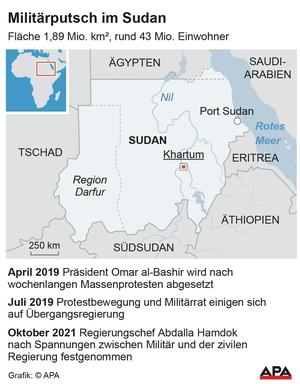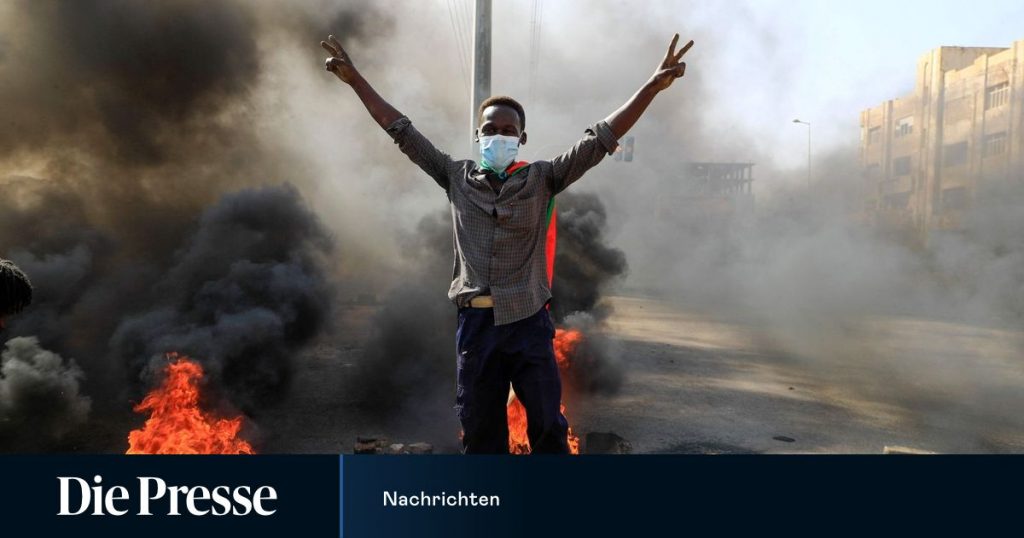“After 30 years of humiliation, we don’t want a new coup,” people chanted in the streets. Doctors and officials want to leave all hospitals and treat only emergencies.
They are tearing up Sudan Protests after the military coup Not from: “Back to the past is not an option,” chanted protesters on Tuesday, who have taken to the streets across the country despite violent action by the military. Many people gathered in the capital, Khartoum, to “save the revolution” that toppled President Omar al-Bashir in 2019.
“That’s enough,” said one protester. “After 30 years of humiliation under al-Bashir, we do not want a new coup now.” The demonstrators declared a “general strike” and “civil disobedience” against the new rulers.
Doctors and officials called for civil resistance through a general strike. The Central Committee of Doctors of Sudan announced, on Tuesday evening, through its Facebook page, that it will withdraw from all hospitals in the country and treat only emergency cases. She added that the military hospitals will be withdrawn completely. Ministries, administration and central bank employees declared a general strike that night.

Internet and telephone connections were again cut off on Tuesday and tanks closed bridges and main roads in Khartoum. According to a pro-democracy medical association, at least four protesters have been killed and more than 80 others injured in the armed forces’ violent crackdown since Monday.
Sudan’s highest general, Abdel Fattah al-Burhan, announced the dissolution of the transitional government and the Transitional Sovereign Council via state television, declared a state of emergency, and announced the formation of a new government with “competent people”. The military is holding ousted Prime Minister Abdalla Hamdok and other civilian members of his government at an undisclosed location. On Tuesday, Al-Burhan announced a press conference at the army headquarters in Khartoum at 1:00 pm.
From the United States to Norway: “Betrayal of the Revolution”
Internationally, the unrest in Sudan was met with heavy criticism: the troika of countries from the USA, Great Britain and Norway, which were previously active in mediating in Sudan, spoke of “a betrayal of the revolution, the transition process and the legitimate demands of the Sudanese people for peace, justice and economic development” .

The United States, as an important supporter of the country’s transition, strongly condemned the military coup and called for a return to civilian government. In addition, the arrested Prime Minister Hamdok must be released immediately, and the US Secretary of State, Anthony Blinken, has demanded. In protest of the coup, the United States suspended its $700 million in financial aid to the country. The United Nations also called for Hamdok’s immediate release. UN Secretary-General Antonio Guterres denounced the “military coup” and called for respect for the “Constitutional Charter”. The UN Security Council is scheduled to hold an emergency meeting behind closed doors on Tuesday.
The United Nations High Commissioner for Human Rights, Michelle Bachelet, spoke of “a catastrophe if Sudan turns back the clock after decades of dictatorship.” The European Union, the African Union and the League of Arab States also expressed their concern.
Diplomatic efforts to transition to a civilian government in Sudan have recently been in vain: US envoy Jeffrey Feltman met General Al-Burhan and Prime Minister Hamdok on Sunday. While both Sudanese committed to democratic transition at the meeting, Al-Burhan announced the dissolution of all institutions in the country and the establishment of Hamdok as well as several ministers and civilian representatives just a day later.
Russia sees “the logical consequence of a failed policy”
Only Russia saw the coup as a “logical consequence of a failed policy” and lamented “large-scale foreign interference”. In Sudan, Russia, Turkey, the United States, and Saudi Arabia are vying for influence. The main focus is on the Red Sea ports of strategic importance to the respective fleets in the region.
In Sudan, after the fall of al-Bashir in 2019, the so-called Sovereign Council took over the affairs of state, with the military and civilians sharing power. Since then, the country has been in a fragile transition that should end with the formation of a civilian government in 2023.
(APA/dpa/AFP/Reuters)

“Food practitioner. Bacon guru. Infuriatingly humble zombie enthusiast. Total student.”








More Stories
Kyiv: Russian Kursk offensive halted
US Presidential Election: Former US Government Officials Warn Against Donald Trump's Election
Netherlands wants to leave asylum system